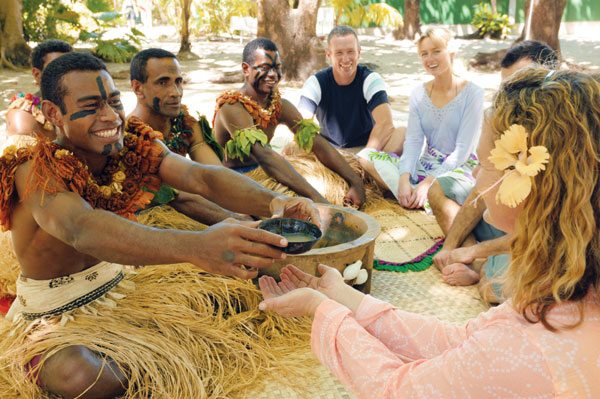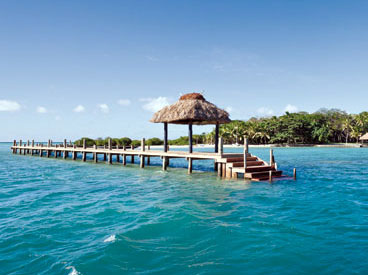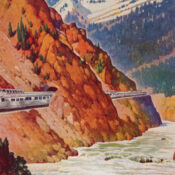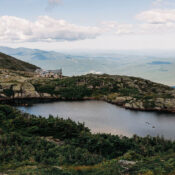
You never dish your own kava; it’s always served by someone else, and you’ll be offered “high tide” or “low tide”: a full bowl or a half. I’ve talked to people who could barely remember where their legs were after a single bowl of low tide. Personally, after losing count of high tide bowls, about all that happened to me was I sloshed when I walked back to my room. But even my tolerance was nothing compared to the Fijians.
With each bowl, the singing gets a little louder, the night grows pleasantly later under Southern Hemisphere stars that form no patterns I recognize at all, and eventually, even though there’s plenty of kava left, we do run out of Tootsie Pops, which are used as a palate cleanser.
The next day, with absolutely no trace of a hangover, we load up in a boat, dangerously armed with booze and a ukulele. And offshore, I realize: Most island groups in the Pacific are spread out enough that all you ever see is the island you’re on; in Fiji, though, the islands are closer together, and from each island of perfect jungle, you see another island just as perfect.
Meanwhile, in the shallows, over the healthiest reefs I’ve seen, are starfish that are a shade of blue that I thought only existed in cartoons, a kind of metallic supernova of blue. It’s a blue that’s almost a pity, because it’s so overpowering; as they swim up to look at my snorkel mask, it takes effort to tear my eyes away and watch the yellow fish, the black fish darting around like flats and sharps on a keyboard, the anemones, the coral heads that rise like mushroom clouds, like what happens if you turn a small kid loose with a really big box of Legos. The water is practically body temperature, and I lose track of time, floating and gawking over the reef for so long that the next day, my shoulders will be their own shade of supernova red.
Paradise is not the place to skimp on the sunscreen.
Yet despite the bright days that seem to last forever—or at least long enough for one more mojito, which I find a lot more effective than kava—each night I’m in the islands, like a magic trick, that soft rain starts to fall about 10 minutes after sunset. The giant fruit bats fly off towards the night, their three-foot wings graceful as ballet dancers who’ve been practicing Swan Lake all their lives; then the sky goes dark and the water starts to come down, as dependable as a Hollywood special effect. And each night, the sound of the rain hitting the jungle leaves is the best lullaby I’ve ever heard.
I’m one of those people who wakes up a lot each night, every couple hours, and in Fiji, each time I wake, I hear that rain and know the jungle will be even greener in the morning. And I’m very happy, unable to resist the impulse to wrap up in a sulu—Fiji’s version of a sarong—and stand outside the raindrops accompanied by the chirp of frogs in the jungle. And the falling water is softer and more soothing than the massage I had on the beach at one of the resorts.
And by morning, the rain has stopped, nothing but tiny shreds of clouds hang over a few mountains; the sun is up and gentle, and Fiji is ready for another perfect day.
Never mind bonus points for Fiji’s little tricks like double rainbows popping over the ocean.
How to spend a day in Fiji: fresh fruit, picked from trees a few feet away from the table, for breakfast; then walk into the water and wait for something beautiful to happen. You won’t be waiting long.
So Tom Hanks got Fiji wrong. He whined about being stuck on Fiji for three-fourths of the movie, when he could have been sitting back with a rum punch and watching waves lap ashore like they were moving in slow motion.
Jodi Foster, though, got Fiji completely right, with the best movie use ever for Fiji, in her film Contact, all about building a great big machine that lets people on earth reach out to talk to people on other planets.
Towards the end of the movie, she ends up not on another planet, but in heaven.
And all those scenes were filmed in Fiji.
Okay, that’s typecasting, but where else could they have gone?
Become a Saturday Evening Post member and enjoy unlimited access. Subscribe now



